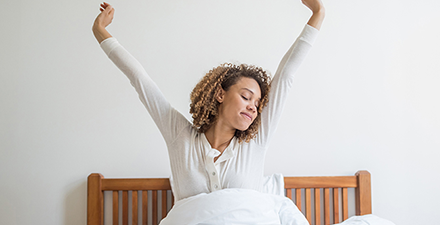
Getting the right amount of quality sleep is critical for the proper functioning of the body. Our sleep environment and our behavior (known as sleep hygiene) can prevent us from falling asleep. (See “13 Tips from a Physical Therapist to Improve Your Sleep.”)
Beyond your sleep hygiene, research suggests that some types of meditation can help improve insomnia. It may even improve sleep quality for those without existing sleep problems.
Physical therapists play a role in the prevention and management of sleep impairments. They also promote healthy sleep behaviors and can help address sleep disorders. Physical therapists can assess sleep positioning for people who have pain, discomfort, or other factors that prevent them from falling asleep.
So what is meditation, and how can it help?
Mindfulness and meditation help bring about a relaxed state of mind that is conducive to falling asleep. This reaction is often described as the relaxation response, or the opposite of the stress response. Relaxation has physical, mental, and emotional benefits.
There are many apps available for your devices that offer guided meditation to help you relax. If you are using one before bed, you can reduce distractions by:
- Turning off notifications.
- Reducing the brightness on your screen.
- Setting the volume to an appropriate level.
4 Common Types of Meditation
There is quite a bit of overlap between the different techniques, but here are the common meditation methods for sleep:
- Mindfulness meditation. Most research on meditation for insomnia has focused on mindfulness meditation. Mindfulness involves focusing on the present. It encourages you to welcome thoughts and emotions in an open-minded, non-judgmental manner.
- Guided imagery and music. Guided meditation for insomnia promotes relaxation by asking the meditator to imagine themselves in a calming place. Yours might be a white, sandy beach or a forest. The soundscapes and soothing guidance of a meditation app or instructor can provide this for you.
- Body scan meditation. In body scan meditation, participants are instructed to focus on different parts of the body. You’re asked to note any sensations of pain, tension, or anything out of the ordinary. This type is closely tied to progressive muscle relaxation, in which participants actively tense and then relax each successive muscle.
- Deep breathing. Deep breathing while engaging the diaphragm is often used in combination with other meditation techniques to enhance relaxation. Two examples of this are:
- The Whiskey Breathing Technique. This is a very slow, deep breathing exercise that can help make you sleepy. It follows a rate of about three breaths per minute or slower. Inhale through your nose while counting to four slowly. Then exhale through your nose while counting down from eight slowly.
- The Box Breathing Technique. Imagine a box with four equal sides. Taking slow, deep breaths, inhale through your nose for four seconds, hold your breath for four seconds, exhale through your mouth for four seconds, and hold your breath for four seconds before inhaling again.
If these techniques aren’t enough to help you relax or if pain, discomfort, or other problems keep you from falling asleep, a physical therapist can help.
Physical therapists are movement experts. They improve quality of life through hands-on care, patient education, and prescribed movement. You can contact a physical therapist directly. To find a physical therapist in your area, visit Find a PT.


